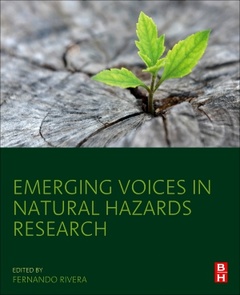Emerging Voices in Natural Hazards Research
Coordonnateur : Rivera Fernando I.

Emerging Voices in Natural Hazards Research provides a synthesis of the most pressing issues in natural hazards research by new professionals. The book begins with an overview of emerging research on natural hazards, such as hurricanes, earthquakes, floods, wildfires, sea-level rise, global warming, climate change, and tornadoes, among others. Remaining sections include topics such as socially vulnerable populations and the cycles of emergency management.
Emerging Voices in Natural Hazards Research is intended to serve as a consolidated resource for academics, students, and researchers to learn about the most pressing issues in natural hazard research today.
1. Bug out bags and first aid kits: Undergraduate college students' awareness, perceptions, preparedness, and behavior around severe weather 2. The gender dimensions of the 2013 Southern Alberta floods 3. Morphometric conditions underpinning the spatial and temporal dynamics of landslide hazards on the volcanics of Mt. Elgon, Eastern Uganda 4. Disaster recovery among older adults: Exploring the intersection of vulnerability and resilience 5. Hurricanes, disasters, and food insecurity: The intersection of two social events 6. Homelessness and inequality in the U.S.: Challenges for community disaster resilience 7. Hazardous or vulnerable? Prisoners and emergency planning in the U.S. 8. The recovery process: The standard used to measure Emergency Management effectiveness in the eyes of the public 9. Institutions of higher education 10. Institutionalizing nonprofit influences post-disaster 11. Gender and representative bureaucracy: A qualitative look at opportunities and barriers for women in local emergency management agencies 12. Natural hazards, resilience, and sovereignty: The case of Puerto Rico and the U.S. Virgin Islands 13. People with disabilities: Becoming agents of change in Disaster Risk Reduction 14. Young, mobile, but alone in the cold and dark: Experiences of young urban in-migrants during extreme weather events in the UK 15. Social vulnerability and individual wellbeing: An empirical analysis of first responders in South Korea 16. How do the perceptions of natural hazards influence migration decisions among ethnic minority farmers? Insights from coastal Bangladesh
Primary: Academics, faculty, researchers, graduate, undergraduate students, professionals and anyone interested in natural hazards research.
Secondary: Emergency managers, policy makers, and local/federal officials. Hazard responders, development experts in the World Bank, UN, USAID officers, and many others. The many academic experts in hazards research in academia, including anthropologists, geographers, geologists, sociologists, public health, and others will be interested.
- Provides a platform for readers to keep up-to-date with the interdisciplinary research that new professionals are producing
- Covers the multidisciplinary perspectives of the hazards and disasters field
- Includes international perspectives from new professionals around the world, including developing countries
Date de parution : 06-2019
Ouvrage de 454 p.
19x23.3 cm
Thème d’Emerging Voices in Natural Hazards Research :
Mots-clés :
#MeToo; Age; Climate perception; Coastal Bangladesh; Collective agency; College students; Corrections; Disaster; Disaster management; Disaster risk reduction; Displacement; Elderly; Emergency; Emergency management; Emergency preparedness; Environmental hazard response; Ethnic minority farmers; Extreme weather; Floods; Gender; Hazardous weather; Higher education; Homelessness; Inequality; Landslide hazards; Lithology; Marginalization; Migration; Migration decisions; Morphometric attributes; Mt; Elgon; Natural hazards; Nonprofit; Older adults; Place; Power outages; Prison labor; Prisons; Public administration; Qualitative methods; Rakhaines; Recovery; Representative bureaucracy; Resilience; Risk; Social capital; Social vulnerability; Terrain conditions; UK; Vulnerability; Vulnerable populations; Women; Young adults


